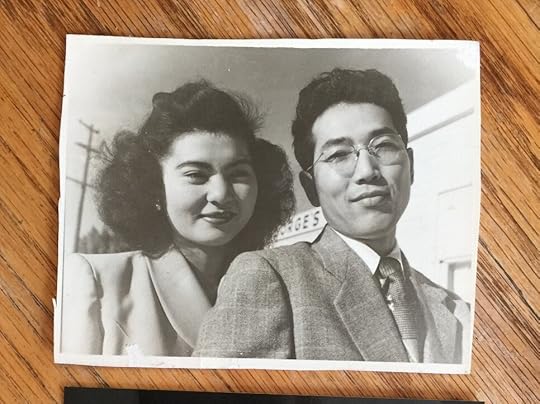Randy Alcorn's Blog, page 50
August 31, 2022
Lily Yamasaki Sato’s Story, and How the U.S. Detention of Japanese Americans Was Not “Fake News”

Alex Harris is a wonderful brother, and a true servant leader. When he attended Nanci’s memorial service on May 15, I wasn’t the only one who noticed he stayed until the very end doing the clean-up and didn’t stop until the job was completely done. The fact that Alex is a young man, and was wearing a suit, stuck out.
I’ve shared about him and his twin brother Brett on my blog over the years. Together they wrote Do Hard Things when they were just eighteen. I said then, and I still say, that Alex and Brett are the real deal, Christ-centered young men of character and vision, committed to serving Jesus with humility and excellence. Alex, now an attorney, has worked as a law clerk for then-Judge Neil Gorsuch and Justice Anthony Kennedy and was named to Forbes 30 Under 30 for law and policy.
Recently I saw one of his tweet threads, talking about his grandmother Lily, mother to his wonderful mom, Sono Harris. (See what I’ve written about Sono.) The life God empowered Sono to live—with class, insight, and joy—is truly unforgettable. The heritage she left her family, and the rest of us, is stunning in its breadth and depth. It’s not surprising that her mother Lily also lived a remarkable life.
Alex was responding to some tweets from Raymond Chang, who had visited Manzanar, one of ten concentration camps where Japanese Americans were incarcerated during World War II. Raymond explains that “The US unconstitutionally incarcerated 127,000 Japanese Americans in camps like this. Over 10,000 Japanese people were forced here.” He describes a conversation he overheard: “When we arrived into the visitor center at Manzanar, a white couple walking out with their very young child said, ‘This can’t be true. The US would never do anything like this. This must be fake news.’”
I think what Alex shares in response is a terrific story, one we need a reminder of especially when someone was calling this part of history “fake news.” He wrote:
Not fake news.
My grandma, Lily Yamasaki—an American citizen—was handed her high school diploma through a barbed wire fence. She was held at the Tule Lake camp.
During her incarceration, a neighbor wrote to oppose work release, stating that, while my grandma “was a good neighbor,” she was “still a Japanese,” “we do not know for sure whether they are loyal,” and “our boys over there” (i.e. soldiers) would “not get that kind of treatment.”
Here’s a photo of grandma from around that time. Her only “crime” was being of Japanese ancestry on the west coast. The U.S. Supreme Court—where her grandson would one day serve as a law clerk—upheld the camps as constitutional.

Alex writes, “Here’s a thread with more of my grandma’s story.”
My grandma, Lily Sato, passed away at 94. As a second-generation Japanese-American who endured the Great Depression, segregated schools, and U.S. internment camps, her life has been and will always be an inspiration. She didn’t want a service, so this thread is my memorial.
Lily was born on April 11, 1925 in Sacramento to Manhichi and Chiyono Yamasaki. During the Great Depression, her family relocated to Florin, where she was forced to attend a segregated elementary school. “Talk about feeling second-rate,” she later said. “That will do it.”
When she was 16 and a senior in HS, Lily and her family were uprooted and placed into internment camps by the U.S. government after the bombing of Pearl Harbor. Her PE teacher brought her diploma to her, handing it over the barbed wire fence. That was her graduation.

After the war Lily met and married my grandpa, Frank Sato, an aspiring artist and decorated veteran of the most decorated unit in U.S. military history: the 442nd Infantry Regiment, made up almost entirely of Japanese-American soldiers.

Frank’s left hip was shattered by a mortar burst in France. He spent 3 years in Army hospitals, underwent 24 operations, and spent 14 months in an all-body cast before his left leg was finally amputated. But while he was in the hospital he met Lily.

The young Sato family eventually settled in Dayton, Ohio, where my mom, Sono, was born, and where Lily worked as a secretary in the Overseas Department of National Cash Register. In 1960, she started her own business—a Japanese gift shop—with her sister, Kim.

Faith did not come until late adulthood. When my mom became a Christian in high school, she brought almost all of her family along with her. But Grandma was reluctant. “I grew up relying on myself, standing on my own two feet,” she said. “I just couldn't turn it all over to Jesus.”

Mom persisted and Grandma soon realized that “God was there all the time, giving me the strength, building up my character, molding me and working out the air bubbles.” She could finally say: “God is good and through all the trials and testing He held us and strengthened us.”
When she died, Grandma had 4 children, 16 grandchildren, and more great-grandchildren than I can reliably keep track of. And she managed to love and shape all of us in big and small ways. She was the first person to ask my wife and I, “So when are you two getting married?”

She was a tireless worker and amazing cook. She made traditional Japanese dishes and the best eggs on toast. Her Danish pastries, which she made in bulk, froze, and mailed to all of her kids/grandkids each December, were the highlight of breakfast every Christmas morning.

She was competitive. She beat us at everything: card games (especially the gambling game Hanafuda, though she rarely let us gamble), ping pong, Janken (Japanese version of Rock, Paper, Scissors), arm wrestling, even basketball (she was an all-star in the internment camps).
Just as she passed, Grandma lifted her arms, like she saw someone and was reaching out to embrace them. My mom? Her husband Frank? Jesus? I’m so glad she is with them. I love you, Grandma. See you soon.

Lily Yamasaki Soto’s Story, and How the U.S. Detention of Japanese Americans Was Not “Fake News”

Alex Harris is a wonderful brother, and a true servant leader. When he attended Nanci’s memorial service on May 15, I wasn’t the only one who noticed he stayed until the very end doing the clean-up and didn’t stop until the job was completely done. The fact that Alex is a young man, and was wearing a suit, stuck out.
I’ve shared about him and his twin brother Brett on my blog over the years. Together they wrote Do Hard Things when they were just eighteen. I said then, and I still say, that Alex and Brett are the real deal, Christ-centered young men of character and vision, committed to serving Jesus with humility and excellence. Alex, now an attorney, has worked as a law clerk for then-Judge Neil Gorsuch and Justice Anthony Kennedy and was named to Forbes 30 Under 30 for law and policy.
Recently I saw one of his tweet threads, talking about his grandmother Lily, mother to his wonderful mom, Sono Harris. (See what I’ve written about Sono.) The life God empowered Sono to live—with class, insight, and joy—is truly unforgettable. The heritage she left her family, and the rest of us, is stunning in its breadth and depth. It’s not surprising that her mother Lily also lived a remarkable life.
Alex was responding to some tweets from Raymond Chang, who had visited Manzanar, one of ten concentration camps where Japanese Americans were incarcerated during World War II. Raymond explains that “The US unconstitutionally incarcerated 127,000 Japanese Americans in camps like this. Over 10,000 Japanese people were forced here.” He describes a conversation he overheard: “When we arrived into the visitor center at Manzanar, a white couple walking out with their very young child said, ‘This can’t be true. The US would never do anything like this. This must be fake news.’”
I think what Alex shares in response is a terrific story, one we need a reminder of especially when someone was calling this part of history “fake news.” He wrote:
Not fake news.
My grandma, Lily Yamasaki—an American citizen—was handed her high school diploma through a barbed wire fence. She was held at the Tule Lake camp.
During her incarceration, a neighbor wrote to oppose work release, stating that, while my grandma “was a good neighbor,” she was “still a Japanese,” “we do not know for sure whether they are loyal,” and “our boys over there” (i.e. soldiers) would “not get that kind of treatment.”
Here’s a photo of grandma from around that time. Her only “crime” was being of Japanese ancestry on the west coast. The U.S. Supreme Court—where her grandson would one day serve as a law clerk—upheld the camps as constitutional.

Alex writes, “Here’s a thread with more of my grandma’s story.”
My grandma, Lily Sato, passed away at 94. As a second-generation Japanese-American who endured the Great Depression, segregated schools, and U.S. internment camps, her life has been and will always be an inspiration. She didn’t want a service, so this thread is my memorial.
Lily was born on April 11, 1925 in Sacramento to Manhichi and Chiyono Yamasaki. During the Great Depression, her family relocated to Florin, where she was forced to attend a segregated elementary school. “Talk about feeling second-rate,” she later said. “That will do it.”
When she was 16 and a senior in HS, Lily and her family were uprooted and placed into internment camps by the U.S. government after the bombing of Pearl Harbor. Her PE teacher brought her diploma to her, handing it over the barbed wire fence. That was her graduation.

After the war Lily met and married my grandpa, Frank Sato, an aspiring artist and decorated veteran of the most decorated unit in U.S. military history: the 442nd Infantry Regiment, made up almost entirely of Japanese-American soldiers.

Frank’s left hip was shattered by a mortar burst in France. He spent 3 years in Army hospitals, underwent 24 operations, and spent 14 months in an all-body cast before his left leg was finally amputated. But while he was in the hospital he met Lily.

The young Sato family eventually settled in Dayton, Ohio, where my mom, Sono, was born, and where Lily worked as a secretary in the Overseas Department of National Cash Register. In 1960, she started her own business—a Japanese gift shop—with her sister, Kim.

Faith did not come until late adulthood. When my mom became a Christian in high school, she brought almost all of her family along with her. But Grandma was reluctant. “I grew up relying on myself, standing on my own two feet,” she said. “I just couldn't turn it all over to Jesus.”

Mom persisted and Grandma soon realized that “God was there all the time, giving me the strength, building up my character, molding me and working out the air bubbles.” She could finally say: “God is good and through all the trials and testing He held us and strengthened us.”
When she died, Grandma had 4 children, 16 grandchildren, and more great-grandchildren than I can reliably keep track of. And she managed to love and shape all of us in big and small ways. She was the first person to ask my wife and I, “So when are you two getting married?”

She was a tireless worker and amazing cook. She made traditional Japanese dishes and the best eggs on toast. Her Danish pastries, which she made in bulk, froze, and mailed to all of her kids/grandkids each December, were the highlight of breakfast every Christmas morning.

She was competitive. She beat us at everything: card games (especially the gambling game Hanafuda, though she rarely let us gamble), ping pong, Janken (Japanese version of Rock, Paper, Scissors), arm wrestling, even basketball (she was an all-star in the internment camps).
Just as she passed, Grandma lifted her arms, like she saw someone and was reaching out to embrace them. My mom? Her husband Frank? Jesus? I’m so glad she is with them. I love you, Grandma. See you soon.

August 29, 2022
What Is Eternity-Minded Stewardship?

Concerning money and possessions, the Bible is sometimes extreme, sometimes shocking. When we come to Scripture, it’s for comfort, not for assaults against our worldview, right? Let God talk about love and grace, thank you. Let us talk about money and possessions—then do with them whatever we please.
Were we honest, that’s what many of us would say.
Some believers ask each other tough questions: “Have you been spending time in the Word? Sharing your faith? Guarding your sexual purity?” Yet how often do we ask, "Are you winning the battle against materialism?” Or, "Have you been peeking at those tempting magazines and websites? You know, the ones that entice you to greed?”
People are more open even about their sexual struggles than about battling materialism, which may be the final frontier. Some churches do talk about getting out of debt. I applaud that. But you can be debt free and still be stingy and greedy. We don’t need to become smarter materialists; we need to repent of materialism and become smart stewards.
Jesus sees our hearts and knows us well. He doesn’t call all disciples to give away everything. He does call us to take radical action that breaks our bondage to money and possessions, freeing us to live under His lordship. He calls all of us to dethrone all secondary treasures in order to elevate Him as our primary treasure. If we value anything or anyone more than we value Jesus, we are not His disciples.
What we do with our money doesn’t simply indicate where our heart is. According to Jesus, it determines where our heart goes. If our heart is where our treasure is (Matthew 6:19-21), then when we move our treasure somewhere else, our heart follows. This is a remarkable truth. If I want my heart somewhere, I need to put my money there.
When people asked John the Baptist what they should do to bear the fruit of repentance, he told them to share their clothes and food with the poor. Then he instructed tax collectors not to collect and pocket extra money. Finally, he told soldiers not to extort money and accuse falsely, and to be content with their wages (Luke 3:7-14).
No one had asked John about money and possessions. Yet his answers showed that John couldn’t talk about spiritual change without addressing how people handle material things.
If John the Baptist were to visit us today, what conclusions would he draw about our attitudes and actions toward money and possessions? Would the evidence convince him we are true followers of Jesus? Or would he see us as baptized versions of the world’s self-preoccupied materialists?
Microsoft executive Tricia Mayer wrote me, “Stewardship is the Christian life. It is about what we do with every resource given to us, every day we walk the earth, and every relationship we have. The difficult task of stewardship is mustering the discipline and will to manage the problem child called money.”
A steward is entrusted with wealth or property that does not belong to him. It’s his responsibility to manage that wealth in the best interests of, and according to the stated wishes of, the owner. God has given us life, time, talents, money, possessions, family, and His grace. In each case He evaluates what we do with what He’s entrusted to us.
The steward is granted by the owner sufficient resources and the authority to carry out his designated responsibilities. When it comes to financial stewardship, God hasn’t handed us a standardized checklist to mark off. Rather, He has provided us His Word with principles for effective financial stewardship—principles we have to wrestle with. A responsible steward consults the Owner, seeking His direction. This requires insight and wisdom far beyond our own. Scripture says, “If any of you lacks wisdom, he should ask God, who gives generously to all without finding fault” (James 1:5).
Do you truly desire God’s wisdom and empowerment in making difficult stewardship decisions (and evaluating your own heart)? Then ask. He won’t leave you in the dark. He has given you His Word and His Spirit to guide you.
And you shall remember the LORD your God, for it is He who gives you power to get wealth (Deuteronomy 8:18).
The LORD makes poor and makes rich; He brings low and lifts up (1 Samuel 2:7).
Both riches and honor come from You, and You reign over all (I Chronicles 29:12).
Stewardship is living in the light of these truths. It’s living with the awareness that we are managers, not owners, of what God has entrusted to us for this brief season. How we handle money and possessions demonstrates who we really believe is their true owner—God or us.
John Wesley offered four questions to help decide how to spend money. Notice how the last three flow directly out of the first one:
In spending this money, am I acting as if I owned it, or am I acting as the Lord’s trustee?
What Scripture requires me to spend this money in this way?
Can I offer up this purchase as a sacrifice to the Lord?
Will God reward me for this expenditure at the resurrection of the just?
If we really believe God is the owner of everything, shouldn’t we regularly be asking Him, “What do you want me to do with your money and your possessions?” And shouldn’t we be open to the possibility that He may want us to share large portions of His assets with those whose needs are greater than ours?
I spoke with a man who’d read The Treasure Principle, my book on giving. He owns a profitable business and believes for the first time that he knows why God has blessed him financially. It’s not so he can drive nicer cars and live in a nicer house. It’s to give it to build God’s kingdom. I told him about several different missions groups and prolife projects, and ways to help persecuted Christians. I wish you could have heard the excitement in his voice as he walked away determined to liquidate more earthly assets and dramatically expand his eternal investment portfolio!
This man followed through, and has given more and more over the years. He isn’t reluctant and guilt-ridden. He’s been liberated from material bondage, and is thrilled to have gotten onboard with what matters! He’s like the man who finds priceless treasure hidden in the field, “Then in his joy he goes and sells all that he has and buys that field” (Matthew 13:44). Do we pity the man for his sacrifices? No! We envy him both for his treasure and his joy.
If God is speaking to you, listen. Nothing’s more fleeting than the moment of conviction. Never procrastinate obedience. Once we stand before His throne, it will be too late to go back and reclaim a lifetime of squandered opportunities. Gazing into the eyes of the Christ we treasure, we’ll know exactly how we should have lived. God has given us His Word so we don’t have to wait to die to find out. And He’s given us His Spirit to empower us to live that way now.
See more resources on money and giving, as well as Randy's related books, including Managing God's Money .
Here
August 26, 2022
Despite Claims Otherwise, Treatment for an Ectopic Pregnancy Is Not an Abortion

Ectopic pregnancies, when gestation takes place outside the uterus, account for an estimated 2 percent of all pregnancies. Most commonly, implantation begins in a fallopian tube but occasionally on an ovary or against the abdominal wall. Usually the pregnancy miscarries without a woman knowing she was pregnant.
Because of the nature of an ectopic pregnancy, the child would normally have no hope of survival. And surgery may be necessary to save his mother’s life. These are tragic situations, but they are not the intentional killing of an innocent person who could otherwise survive.
Unfortunately, since the overturning of Roe and Casey, there has been much misinformation on the internet and in the media about ectopic pregnancies, and claims that women will not be able to receive medically necessary treatment in states that have restricted elective abortion. This is a straw man and/or a red herring argument.
What do doctors have to say? The American Association of Pro-Life Obstetricians “recognizes the unavoidable loss of human life that occurs in an ectopic pregnancy, but does not consider treatment of ectopic pregnancy by standard surgical or medical procedures to be the moral equivalent of elective abortion, or to be the wrongful taking of human life.” (See their position statement on ectopic pregnancies.)
They also say, “Although treatment for ectopic pregnancy results in the unfortunate death of the embryo, this is not the intent of the treatment. The intent is to save the life of the mother. The sole intent of an abortion is to end the life of the developing human being. Therefore, legislation restricting induced abortion should not be seen to limit a physician’s ability to treat ectopic pregnancy.” (Emphasis mine.)
They state, “To clarify, elective abortion is defined as those drugs or procedures used with the primary intent to end the life of the human being in the womb. Elective abortion is not treatment of a miscarriage or an ectopic pregnancy nor is it separating the mother and the baby at any gestational age to save a mother’s life. There are no laws in any state in the United States which criminalize treatment of any of these conditions.”
This is a great video from Live Action, done by neonatologist Dr. Kendra Kolb, explaining the pro-life reply to “abortion can be medically necessary.” Her comments on ectopic pregnancies start at the 3:23 mark:
(The whole “Pro-Life Replies” series is excellent. You can see all the videos here, including How to Reply to: “Women Will Die From Illegal Abortions” and How to Reply to: “A Fetus Is Not A Person.”)
Finally, here’s an excerpt from an episode of The World and Everything in It, specifically addressing the new pro-life laws and ectopic pregnancies:
MARY REICHARD, HOST: Let’s get right to it. Is it now illegal in some states to treat miscarriages and ectopic pregnancies?
LEAH SAVAS, REPORTER: The short answer is no, but we can approach this no from two angles. The first one is legal, and the second one is medical. So I'll start by looking at the legal side of this.
If you actually look at the laws in the 21 states that already have protections for unborn babies, they all make exceptions to allow for abortions when the life of the mother is at risk. So that's the key part. So women can still get abortions if the pregnancy is threatening their lives. That would include removing ectopic pregnancies, because if the baby who in an ectopic pregnancy implants in the fallopian tube, or somewhere else outside of the uterus, if the baby's allowed to grow, the fallopian tube could rupture, the mother could bleed to death. That is obviously a life threatening situation. Another life-threatening situation would be when a baby miscarries but does not fully evacuate the mother’s body. If the baby’s allowed to remain there, that could lead to an infection and that could threaten the woman’s life as well. So in those two cases, obviously, there are good medical reasons to remove the baby.
REICHARD: But that wouldn’t count as an abortion, would it, if the baby has already died? Abortion ends a life, and there’s no life in that case.
SAVAS: That’s correct. But this is where things can get a little confusing for some people because one medical term for miscarriage is a “spontaneous abortion.” That’s sometimes what it’s called medically. But many laws get really specific about what counts and what doesn’t count as an abortion. And it clarifies in definitions that miscarriage and ectopic pregnancy removal is not an abortion.
One of those states that makes that clarification is Arkansas. They have a conditional law that went into effect the day that the Supreme Court overturned Roe v. Wade. It prohibits abortion except to save the mother’s life. And in the definition section, the legislation defines abortion and clarifies that the act is not an abortion if performed with the purpose to remove a dead unborn child caused by spontaneous abortion or removing ectopic pregnancy. That’s a direct quote from the law.
REICHARD: What about states with laws that don’t make that clarification?
SAVAS: So, my state of Michigan is one of those states that has a law protecting babies from abortion in all cases. There’s a debate right now as to whether or not it’s actually in effect. But that’s a totally different story. It does make exceptions for the life of the mother, but doesn't make these clarifications about ectopic pregnancies and miscarriages. So I talked to the legislative director of Right to Life of Michigan about this and she referred me to a part of the public health code that does define elective abortion and clearly states that it does not include treating a woman who has had a miscarriage or who has an ectopic pregnancy. But again, even if a state doesn’t make this clarification in another part of the law, doctors always have that life of the mother exception to fall back on.
REICHARD: So there is a legal difference between, say, removing an ectopic pregnancy and an elective abortion. But is there any difference medically?
SAVAS: Yes, there is a medical difference and even Planned Parenthood says so. If you go to their website, they have a page that talks about ectopic pregnancy. And on one of the questions that it’s answering on the page, it says that treating an ectopic pregnancy—and this is a quote from the page—"isn't the same thing as getting an abortion.” It then goes on to clarify that abortion involves ending a pregnancy that’s in the uterus, while removing an ectopic pregnancy is removing a pregnancy that has implanted outside of the uterus, usually in the fallopian tubes. And you have to remove that through laparoscopic surgical procedures or a drug called methotrexate. And that's exactly what the page says on Planned Parenthood.
Listen to the whole episode here.
I encourage you to download (without cost) my short book Pro-Choice or Pro-Life: Examining 15 Pro-Choice Claims—What Do Facts & Common Sense Tell Us? It will equip you in your conversations and also is a great book to share with those who are pro-choice or are on the fence.
Photo by Towfiqu barbhuiya
August 24, 2022
How Should We Understand Humanity’s Deepest Desires? Are They God-Given?

Note from Randy: Our Eternal Perspective Ministries staff members sometimes answer questions on my behalf, often quoting from things I’ve written. I am often struck by the fact that what they write back is better than what I would have. I appreciated this answer that Stephanie Anderson wrote to a pastor who emailed us to ask some questions about desire.
A reader wrote us to ask:
Could you help me understand desire theologically and biblically? Could a believer have good and bad desires? I’m wrestling with the already-but-not-yet state believers are in and the fallenness of man. I believe that our desires are tainted, corrupted, and the only desire that can ever be "good" is due to Christ’s sanctifying work. Or is our innate desire good only because of creation?
I'm Stephanie with Eternal Perspective Ministries, and am responding on Randy’s behalf. Years ago Randy taught a course called the Theology of Desire. Unfortunately, we don’t have the recording of the class, but we do have several things he has written related to desire that may be helpful for you.
Randy does believe that God created all people with a right desire to know and love Him, but the Fall has twisted that desire. Due to sin, “Man is left with a ‘hole’ in his heart that only God can fill; but he attempts to fill it with power, pleasure, possessions, religious activity, etc.—all are dead-end streets that can’t bring fulfillment.” Randy writes, “Christianity teaches that Jesus takes our sins away while redeeming our desires. Desire is an essential part of humanity, a part that God built into people before sin cast its dark shadow on earth.”
He quotes Blaise Pascal, who wrote,
What else does this craving, and this helplessness, proclaim but that there once was in man a true happiness of which now remain to him only the mark and empty trace, which he in vain tries to fill from all his surroundings, seeking from things absent the help he does not obtain in things present. But these are all inadequate, because the infinite abyss can only be filled by an infinite and immutable object, that is to say, only by God Himself.
Randy writes this about desire:
We were made for a person and a place. Jesus is the person. Heaven is the place. They are what we desire. We’ll never be satisfied with less. No other person, no other place will fulfill us. At best lesser objects of desire can give us hints and foretastes of—and draw us closer to—who and what we ultimately desire. At worst, they can become idols, God-substitutes and Heaven-substitutes.
All people seek the same things (God and Heaven), but the world, flesh, and devil lead us down dead-end streets, promising fulfillment. Satan’s central strategy is to lie to us about 1) what we really want and 2) how to get it. People spend their lives chasing mirages, leading to disillusionment, addiction, shame, and destruction.
…The Fall twisted our desire, but eternity is still in our hearts (Ecclesiastes 3:11). Our Lord can restore godly desire; we can cultivate it and point it toward its true objects. We don’t need less desire, but more, pointed the right direction. We need to not simply deny our worst desires, but cultivate our best ones, by identifying and losing ourselves in what we really desire.
You can read more here, but I believe the main answer to your questions is in what Randy says there: “Our Lord can restore godly desire.” As Christians, it is our responsibility to cultivate the right desires, as we partner with His Holy Spirit (we see an example of such partnership in Colossians 1:29 where Paul wrote, “I labor, struggling with all his energy, which so powerfully works in me”). And of course, one day in Heaven, our desires will all be perfectly righteous and completely fulfilled.
Three books Randy would recommend for further study of this subject are:
1) The Dangerous Duty of Delight by John Piper
2) Desire: The Journey We Must Take to Find the Life God Offers by John Eldredge
3) Addictions - A Banquet in the Grave: Finding Hope in the Power of the Gospel by Edward T. Welch
And here are some resources from Randy you may like to read:
Hunger, Thirst and Craving God
Longing for God and Joy, from Augustine
Longing for Joy, in C. S. Lewis, Part 1 and Part 2
Deepest Longings of Human Hearts
Will We Have Desires in Heaven?
Photo by Arif Mills on Unsplash
August 22, 2022
“I Am Now So Excited about Heaven”: Some Encouraging Letters from Readers

In the last six months, perhaps partly because of Nanci’s cancer battle and homegoing, our ministry has heard more from people about the Heaven book than ever before, as well as about several of my other Heaven-related books. Hope you enjoy these letters from readers. They certainly encouraged me!
You opened my eyes and heart to the true Heaven after I read your book Heaven. One evening I sat on my patio after reading a few chapters of your book and decided to get my Bible out and read Revelation. I actually cried because it’s there—Scripture tells us what Heaven is, and I feel so blessed.
It was truly a blessing when I was directed to read Randy’s book on Heaven. When my wife passed in April, I found myself immediately praying to the Lord, how do I talk to her—I know she's in Heaven but do I just turn my face skyward and talk? And I asked, what’s the biblical way to keep in touch with her?
The very next day, as if directed by that small quiet voice that talks to me many times, I found myself digging through her bookstack near her easy chair. There was Heaven, Randy Alcorn's book. I wasn't surprised she was reading it. She had stage 4 cancer, metastatic breast cancer, for the last 6 years. I immediately started reading it and became enthralled by the book. I was very grateful for the book. I took great comfort in it, and it helped me grieve for her before I had any other grief resources. At this point in time she had passed maybe a week earlier; maybe 10 days earlier. Anyway, throughout the reading of the book (read it in two and a half months) I felt the Lord had answered my prayer and was giving me direction on how to view Heaven and how to view her place there and how to communicate with her in Heaven through the Lord Jesus Christ.
As a side note, I’ve been a committed Christian since 2008, attend [a Bible-believing church], and am a member of a small group Bible study that meets regularly. Despite all that, before reading Heaven, I had very little clear information about what Heaven is or what to expect in Heaven.
I am reading Heaven right now. This book is going into my permanent library. It’s making me think about Heaven in new ways. Thank you.
Randy Alcorn’s Heaven book meant so much to both me and my dad. I read it when it first came out after I delivered stillborn twins. I then loaned it to my dad who read it and recommended it to all his aging friends. It made both of us long for our eternal home, and played a huge role in comforting us when other loved ones passed. God truly has His hand on your ministry as it is blessed millions that you don’t even know about.
My dad was a major league baseball pitcher for many years and used baseball as a platform to share his faith with others. I made a little video with him several years ago for his 80th birthday party. I thought you might enjoy seeing it.
Because Randy, through God's Word, had painted such a beautiful picture of Heaven for us, my dad and I had several incredible conversations about his next step before he left this earth. Those conversations will always be some of my fondest memories. Please thank Randy for the way he allows God to use him to touch so many lives. Thanks for all you do as well. In a world that is increasingly dark, you’re having a profound impact.
I am almost up to page 100 of Deadline, and I have to tell you that, despite reading your theological book on Heaven, I was not particularly moved, but the conversation Finney has with Zyor and Zyor’s telling of what Finney will be experiencing now that he is in Heaven has fired me up. I have realized I need to learn and discover, otherwise I am bored. I am now so excited. Thank you.
My mind and heart go to Heaven often. Twelve years ago, when my mom was dying of cancer, she gave us girls your small little book on Heaven. Then I gave the same book to my dad prior to his passing. Two weeks before he died, our pastor led him to Jesus. Your book on Heaven is a great tool to draw people to Jesus.
Being in God’s word more the last 15 years have definitely changed my life and thoughts about Heaven. A friend introduced me to your book Heaven, and I recommend it to others (I reread many parts I have marked). I love the chapters about animals. We grew up in the city, but God gave us a small farm six years ago. It’s amazing how much Scripture comes alive from working, living, and teaching about Gods creation. Thank you for being faithful and sharing what you’ve learned and what God has revealed to you. It spurs me on have a closer relationship with God and to keep reading.
Your book We Shall See God is what God used to minister to me when God took my son and a year later my husband. God used it to open up my eyes of the joys of Heaven, and that dying for the believer is but going home to the One we were made for and to the place we are made to be.
It has been a comfort to me and my children to listen to Heaven for Kids after my dad, their beloved papa, departed this earth a few months ago. All the questions they were asking me were addressed and supported by Scripture. It’s so hard to continue on here without him. We miss him so much. But there is peace in knowing that he believed in Jesus and in learning more about what the Bible says about Heaven.
Growing up, my vision of Heaven was not a reality my heart accepted enthusiastically. When I read Deadline decades ago, I literally sobbed. It was as if my heart embraced the picture set out before me. I could envision my eternal Home with awe and excitement. I will always be grateful. Randy. I have used your book as a tool to reach out to others.
August 19, 2022
How a Friend’s Stand for Christ Made an Eternal Difference
I’ve not met Garrett Kell in person, but we’ve interacted some online, including him reaching out last year to say he was praying for my precious Nanci. That meant so much to us. Garrett is an author and the pastor of Del Ray Baptist in Alexandria, Virginia, and also posts great things on Twitter, including video clips (sometimes quite funny ones), which he pairs with spiritual insights. I’m grateful for his life and ministry and encouragement. (This is a positive example of being on Twitter!)
I hadn’t read Garrett’s testimony before, but one of our staff shared it with me. It’s powerful. I think you’ll be touched just like I was. —Randy
The Stand That Saved My Soul
By Garrett Kell
On Halloween night 1998 I threw a party in my apartment at Virginia Tech. I was 20 years old and was in the wildest season of my life. I had three girl roommates, a live-in girlfriend, and I spent most of my spare time smoking weed, doing lines of cocaine, and drinking.
On that Halloween night, I was geared up for what I expected to be a good time. Because the party was going be so “unforgettable,” I invited an old friend from high school down for the weekend. Dave and I had played hoops and partied together over the years, so I was excited to see him.
When Dave arrived, I greeted him and escorted him back to my room where I proudly unveiled the welcome gifts I’d prepared for him. On my desk was a fat bag of weed, a 6’er of his favorite beer, and I told him I had a girl he could get to know for the weekend.
But Dave didn’t respond like I expected he would. Instead, he gently closed the door and sat on the bed. He looked me in the eyes and told me he didn’t do those things anymore. He said he’d become a Christian and that he loved Jesus now and the reason he came to the party was to tell me that Jesus loved me too.
I laughed him off.
For the rest of the night Dave stayed at the party with people going crazy all around him. Other friends came up and asked me what was up with my buddy and when I told them he was a Christian we’d all sneer and say “Oh, poor guy” like he’d caught a disease or something.
But as the night went on, my heart was uneasy.
In that room, with the music bump’n and laughter roll’n, I was haunted. As I looked at Dave, I saw he had a peace that no drink or high or lover could give. The party eventually ended, but the story was just beginning.
Over the next several days, Dave and I spoke about Jesus and about the Gospel. He gave me Scriptures to read and tried to answer my questions and endured my mocking. We spoke on the phone several times and exchanged emails. What follows is the family friendly version of an email I sent him about a week after his visit.
Dave, dude, we have to talk. Its great and all that you’re Mr. Religious now, but I want you to know I’m worried about you. I want you to be careful that you don’t go overboard and start getting all weird on me. I mean I know that going to church is a good thing and that God is real and all that, but if you don’t watch it you’re going to miss out on what life is really all about.
I know you are just trying to be a good boy and all, but when you came down here and wouldn’t drink, you looked like an idiot. I mean you were just sitting there with a cork in your mouth. What is wrong with you?
I’m not trying to be a jerk, but I’m really worried about you. I know you are just preaching at me because you are my boy and all that, but I know that I’m OK, God and I have our own little understanding. I know I get crazy now and again, but I don’t think God is going to send me to hell for having a good time. I mean he understands I’m just having a little fun. I’m not a bad person and he knows my heart and all that. I agree I get a little crazy now and again, but it’s good for the soul, right? Well, enough of that, I’m sure you’ll be back to normal soon and we can smoke a fatty to celebrate. Be a good boy and tell Jesus I said hi.
Garrett
During another party a week or so later I felt myself becoming uncomfortable. I was feeling haunted, though I couldn’t explain it to myself. I felt dirty and confused, so I retreated to my bedroom and closed the door and said, “OK, God, if you’re real, show me something.” As I looked down in exhaustion, I saw the corner of a Bible that my parents had given me when I went off to college. Until that night it had been hidden under my bed. But for some reason, that night, it was peeking out.
I sat at my desk and played Bible roulette. The Bible opened to Ezekiel 18. I began reading and came to this,
“The person who sins is the one who will die…But if wicked people turn away from all their sins and begin to obey my decrees and do what is just and right, they will surely live and not die. All their past sins will be forgotten, and they will live…Do you think that I like to see wicked people die? says the Sovereign Lord. Of course not! I want them to turn from their wicked ways and live…Put all your rebellion behind you, and find yourselves a new heart and a new spirit. For why should you die…I don’t want you to die, says the Sovereign Lord. Turn back and live!” (NLT).
That freaked me out.
So I closed the Bible and said, “God, let’s try this again.” I opened again and this time it fell open to Romans 2 which says, “Don’t you see how wonderfully kind, tolerant, and patient God is with you? Does this mean nothing to you? Can’t you see that his kindness is intended to turn you from your sin?”
That really freaked me out.
A few weeks later I was at home on Christmas break, and I was doing a drug called Ecstasy. Sometime after midnight I became strangely sober and felt an overwhelming burden to call Dave. So at 2 a.m. Dave came up to my house, carrying his Bible, with tears rolling down his cheeks.
We sat down, and I told him I needed to know more about God. He asked me if I knew what he was doing when I called him. He went on to tell me that when I called him, he was doing the same thing he’d been doing every night since he left Virginia Tech—he was on his knees praying for me.
Over the next few days and weeks, I continued to read the Bible and have conversations with Dave. He told me that God made me to love and worship Him. He explained that the guilt I was feeling was God showing me that I was in rebellion against Him and was on my way to hell. He explained that Jesus died for sinners like me and then rose from the dead to extend mercy to me if I would turn from my sins and believe in Jesus. He told me that Jesus would forgive all of my sins, change my life, and make me His forever.
I’m not sure if it was that night or in the weeks that followed, but God saved my soul. I began reading the Bible, and it was no longer a book of old stories, but now it was like a spotlight that searched my soul and showed me the depths of my sin and the even greater depths of God’s love for me in Jesus.
Dave made a stand for Christ that night at Virginia Tech. God used him to get a message to me that eternally altered my life. Now, every Halloween night I call Dave and thank him for the stand. God used Dave’s stand to save my soul and my life from utter destruction.
I’m a very unlikely person to be a Christian. I loved my sin. I loved my life. I had a very hard heart. Dave was the 17th person to have some sort of Gospel conversation with me. I didn’t want Jesus. But for some reason, He wanted me.
As you read this, I want to encourage you to remember that God’s grace is stronger than the hardest heart. Romans 1:16-17 says “the Gospel…is the power of God for salvation to everyone who believes, to the Jew first and also to the Greek. For in it the righteousness of God is revealed from faith to faith, as it is written, ‘But the righteous man shall live by faith.’”
Who is the most unlikely person you know to become a follower of Jesus?
Take a moment to think.
You have a name?
Jesus can save them.
And you just might be the person He uses to get the Gospel to them.
The Gospel is the power of God for salvation, for rebels like me and rebels like you.
Make a stand for Christ and trust Him to use it for His glory.
That stand may just save a soul.
Photo by Aaron Owens on Unsplash
August 17, 2022
Remembering Nanci, Anticipating Heaven: My Interview on the Chris Fabry Show

A friend recently asked how I’m doing. Nanci’s absence in my life is profound, but I think under the circumstances, I am doing well. My grieving is probably nine parts joy for every one part sorrow, but that is mainly because Nanci and I spent so much time talking about the world to come, and she would walk me through her afterlife bucket list. We would talk of adventures together on God’s New Earth, and that is all still ahead of us. So her death is a heartbreaking interruption to be followed by an everlasting reunion in a world without sin and suffering and grief, where happiness will be the air we breathe.
Had Nanci died suddenly, without warning, it would’ve been much tougher. There were years of grieving for what she had already lost, anticipatory grief as with a broken heart I realized nearly a year ago she would never be able to walk her beloved dog again in this life. I remember when I knew that unless God chose to heal her, we would not go out to a restaurant together or to Maui, her happy place. When we had to cancel going to a football game to sit with the family of a beloved quarterback friend, I knew we would not go to another football game together, and there would be no more of our grandsons’ basketball games and tennis matches at their high school that their mother and aunt attended and that I attended, just a mile from our home. That final family gathering where she spoke into the lives of all of us, including her daughters and grandsons, was like a perfect frame around her life, for which I am deeply grateful to God.
 When I read the grief books, I don’t struggle with anger or resentment or regrets, but my heart overflows with gratitude. So the grief is very real, but already it pales in comparison to the joy of the eternal life Jesus purchased for us with His blood. I have no doubts where Nanci is and whether we will be together again. And that makes the pain far more bearable. There is an overwhelming sense of joy that Nanci has been delivered from her suffering of those last 4 1/2 years.
When I read the grief books, I don’t struggle with anger or resentment or regrets, but my heart overflows with gratitude. So the grief is very real, but already it pales in comparison to the joy of the eternal life Jesus purchased for us with His blood. I have no doubts where Nanci is and whether we will be together again. And that makes the pain far more bearable. There is an overwhelming sense of joy that Nanci has been delivered from her suffering of those last 4 1/2 years.
Jesus is Nanci’s best friend and my best friend. She is there with Him, and He is here with me. So Jesus is the bridge that keeps us connected until we live in that new world, with new bodies and minds, that He is preparing for us. The connection I feel to her through Him is profound.
As I wrote another friendly recently, God gets our pain and holds us close. That is a great combo. Many people believe in a God who is distant and understands only in the sense that He is omniscient, not that He has actually entered into our suffering in Jesus (Hebrews 2 and 4). That makes all the difference. I’ve been enjoying and clinging to the promise of Jesus that He no longer calls us servants, but friends (John 15). Of course, we still are servants, but for Him to call us a friend is encouraging beyond measure. And that He is not just a good-time friend, but a friend in our suffering is the best of all worlds.
A few weeks ago I was on the Chris Fabry show, sharing about Nanci and life since her homegoing. I always enjoy talking to Chris—he’s a good brother I’ve known for many years (many have listened to my big Heaven book on audio, and they hear the voice of Chris Fabry when they do). I was honored when he asked me on his program to talk about Nanci.
You can listen to the whole interview here.
August 15, 2022
Should We Want Our Children to Be Happy?

It’s common to hear advice to Christian parents encouraging them to want more for their children than “just happiness.” While I believe such advice is meant well, we need to address the concept of happiness carefully when it comes to our kids.
Yes, children frequently want to stay up late, eat cookies before bed, play video games for hours, and avoid their homework, imagining those things will bring them happiness. But wise parents know better. They, too, want their children to be happy—the difference is, parents know what will keep children happy in the long run. Because they sometimes need to tell their children “no,” it might seem like their children’s happiness isn’t something that conscientious parents should concern themselves with. But there is a right kind of happiness and joy we should want for children and grandchildren: one that is Christ-honoring and God-centered.
Our children will long for happiness.
God built a desire for happiness into our children, just like it’s built into every person who ever has or ever will live. The important question is, where will they seek that happiness? Will they look for it in Christ and in living a life rooted in Him, or will they seek it in the world and its endless empty mirages?
Any parent who tries to make their child repent of being motivated by happiness is fighting a losing battle. Distancing happiness from the gospel sends a false and damaging message.
Yes, we want our children to experience happiness—the happiness that comes from knowing and following Christ and living a life that is pleasing to Him. Teaching them that they will experience difficulties and suffering, and can also experience a deep, God-given happiness despite (and sometimes because of) those challenges, can strengthen their faith and fill them with purpose.
We’ve all observed parents who say, “I just want my children to be happy,” which means they will give their children whatever they want or allow them to pursue anything they feel will bring them gratification, even if it’s contrary to God’s word. This is not the kind of happiness I’m speaking of. Such parents should actually want more for their children—such as to love God, and therefore be respectful, virtuous, and generous. “The father of the righteous will greatly rejoice; he who fathers a wise son will be glad in him” (Proverbs 23:24).
As a young man, Samson chased what he thought would make him happy. After going where he probably shouldn’t have, he came home to his father and mother saying, “I saw one of the daughters of the Philistines at Timnah. Now get her for me as my wife” (Judges 14:2). They asked why he would go to a godless nation to find a wife. But Samson insisted, “Get her for me, for she is right in my eyes” (verse 3). Wanting their boy to be happy, his parents gave in. The utter ruin and misery that followed, like one domino falling into the next, is a warning against our imagining that we and our children can be trusted to know better than God what will make us happy.
Proverbs 23:15 says, “My son, if your heart is wise, my heart too will be glad.” Notice the word too here. This verse assumes that the child’s wisdom will bring gladness to the child, as well as to the parent.
Happiness, rooted in God, is better than self-focused “unselfishness.”
Sometimes we get confused, thinking we’re being selfish for wanting to be happy. Jonathan Edwards said, “It is not a thing contrary to Christianity that a man should love . . . his own happiness. . . . Saints, and sinners, and all alike, love happiness, and have the same unalterable and instinctive inclination to desire and seek it.”
Jesus says: “If anyone would come after me, let him deny himself and take up his cross daily and follow me. For whoever would save his life will lose it, but whoever loses his life for my sake will save it. For what does it profit a man if he gains the whole world and loses or forfeits himself?” (Luke 9:23-25).
Many think that Jesus’ primary message here is the virtue of selflessness and self-sacrifice. But take another look: He calls us to lose life for His sake by appealing to our desire to find life! It’s not “selflessness” in the sense of doing what’s bad for ourselves; rather, it’s honoring and following Christ and thereby doing the best possible thing for ourselves!
C. S. Lewis began his great sermon “The Weight of Glory” by saying this:
If you asked twenty good men today what they thought the highest of the virtues, nineteen of them would reply, Unselfishness. But if you had asked almost any of the great Christians of old, he would have replied, Love. You see what has happened? A negative term has been substituted for a positive, and this is of more than philological importance. The negative idea of Unselfishness carries with it the suggestion not primarily of securing good things for others, but of going without them ourselves, as if our abstinence and not their happiness was the important point.
Lewis went on to make this critical point: “The New Testament has lots to say about self-denial, but not about self-denial as an end in itself. We are told to deny ourselves and to take up our crosses in order that we may follow Christ; and nearly every description of what we shall ultimately find if we do so contains an appeal to desire.”
It’s possible for someone to act sacrificially and selflessly in the best interests of others while enjoying the fruit: feeling good about having done well and receiving God’s approval and reward.
Parents are called to model finding happiness in Christ.
Some parents believe that looking after their children’s happiness means constantly saying no to their own. But if they don’t take care of themselves, failing to model finding happiness in God, they’ll deprive their children of happiness too. (We’ve all known the overbearing, codependent mother who does everything for her children while reminding them of all her sacrifices. Her unnecessary sacrifices are self-serving in the sinful sense, but in fact, they don’t serve her well. They end up making both her and her children miserable while she exclaims, “All I ever wanted was for you to be happy!”)
Flight crews routinely announce, “If you’re traveling with a child or someone who requires assistance, in the case of an emergency, secure your own oxygen mask first before helping the other person.” Those instructions may sound selfish, just as it sounds selfish to say that one of our main duties in life is to find happiness in God. But only when we’re delighting in our Lord do we have far more to offer everyone else—our children included.
Proverbs 20:7 says, “The righteous live a life of integrity; happy are their children after them” (CJB). May we model and pass onto our children a rich heritage of Christ-centered happiness.
Browse more resources on the topic of happiness, and see Randy’s related books, including Happiness and Does God Want Us to Be Happy?
Photo by Joice Kelly on Unsplash
August 12, 2022
What Is the Difference Between Judgment and Discernment?

In this four-minute video, Alisa Childers, author of Another Gospel A Lifelong Christian Seeks Truth in Response to Progressive Christianity, answers the question, “What Is The Difference Between Judgment and Discernment?”
Here are some related thoughts to what Alisa shared:
Matthew 7:1-2 says, “Do not judge, or you too will be judged. For in the same way you judge others, you will be judged, and with the measure you use, it will be measured to you.”
So clearly here Jesus is saying, “Don’t judge.” But the context is king when we’re interpreting Scripture—and in verses 3-5 he goes right on to say:
How can you say to your brother, “Let me take the speck out of your eye,” when all the time there is a plank in your own eye? You hypocrite, first take the plank out of your own eye, and then you will see clearly to remove the speck from your brother’s eye.
It’s clear that “Judge not” does not mean you can’t see a speck in your brother’s eye or that in seeing it you have no responsibility to help your brother remove it. On the contrary, He’s saying yes, see that speck in your brother’s eye, but take the log out of your eye first so you can help him.
So “judge not” doesn’t mean “Don’t discern.” We are to help each other, which requires a certain amount of discernment. Then, Jesus says in the very next verse (6): “Do not give dogs what is sacred; do not throw your pearls to pigs.”
Without even getting into the meaning of that verse, we can see that this requires discernment. Clearly it requires we see that a person can be acting like a pig and that there are certain things that we need to be careful of putting in front of them.
Right in the immediate context of “Judge not” you have with great clarity evidence that you are still to be discerning. We are not to go around condemning people. But at the same time, we’re to recognize what God says in His Word. If God says in His Word that adultery is a sin, and He clearly does, I am not being judgmental if I look at a person committing adultery and conclude that they are sinning. I’m simply believing what Scripture says.
If I have a relationship with that person, I need to go to them and say, “You know, what you’re doing is not right. God is not pleased with this and He’s going to judge you for it. You need to repent and turn to Christ.”
You might say, “Now that’s condemning them and judging them.” No—that’s just believing what God has said is true and then trying to help the person because sin is in no one’s best interest. Sometimes we act as if we should look the other way, just let our friends and family members go on with their sins, and never say anything about it. Well, that’s not good for them. Sin is not good for us; righteousness and holiness is. And it’s good for our brothers.
So judge not, yet use discernment.
Photo by Severin Höin on Unsplash



